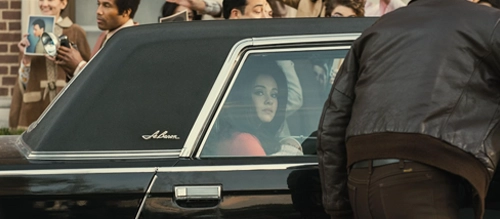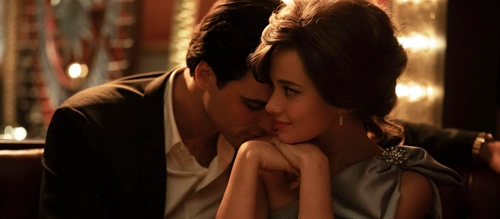
Priscilla (2023)
Director: Sofia Coppola
Screenwriter: Sofia Coppola
Starring: Cailee Spaeny, Jacob Elordi, Ari Cohen, Dagmara Dominczyk
It ought to be an impossible task to follow up Baz Luhrmann’s Elvis Presley extravaganza. Like the man himself, Luhrmann’s Elvis was a pageant of spectacle, leaving no stone unturned as it followed the infamous King of Rock and Roll from birth to death. So, it seemed like a futile endeavour when Sofia Coppola announced that she would be adapting Priscilla Presley’s memoir “Elvis & Me” into her next feature film. With Elvis fresh in our minds, what else could we possibly glean from a new Presley perspective? Well, as with all great tales, there are two sides to every story.
The story of how Priscilla met Elvis feels plucked straight from a teenage girl’s Wattpad fanfiction. At just fourteen years old, and after begging for permission from her parents, Priscilla (Cailee Spaeny) attends a party that Elvis (Jacob Elordi, The Kissing Booth) throws at his rented home in West Germany. Elvis can’t help falling in love with Priscilla, immediately recognising their shared loneliness and longing to go back home to the United States. From their meeting onwards, Elvis revolves his life around Priscilla. ‘I like talking to her,’ he explains to her father when he expresses concerns about the negative effect Elvis is having on Priscilla’s school work. Their relationship is a bubble of bliss: passionate kisses, endless talking, dates, charm and newfound popularity. Then Elvis’s military service ends, the bubble pops, and he returns to America to continue his reign as The King.
She follows him, like we all would. His piercing blue eyes and mesmerising aura are all she can see, all she can think about. After months of longing, Elvis manages to convince Priscilla’s parents to let her finish high school in the US. While her classmates can only fantasise about kissing Elvis, Priscilla gets to live the dream, spending her days with her head in books and her nights in his arms. Yet things aren’t quite the same once Priscilla gets to Memphis. Elvis, who appeared so perfectly absorbed by his love for Priscilla reveals himself as a devil in disguise, and Graceland, his picture-perfect home, becomes Priscilla’s very own heartbreak hotel.
The grandeur of Elvis fades into the background of Coppola’s tale. We see him tailed by adoring fans, but through Priscilla’s eyes we experience him as a regular man. Although he expertly adopts the signature moves and deep southern voice, it’s an understated performance from Jacob Elordi. The celebrity persona that we have come to recognise as Elvis is missing. By muting the all-consuming presence of Elvis, Coppola pushes Priscilla into the forefront, claiming back some agency over her story. She makes no effort to sanitise Elvis’s behaviour or to tiptoe around his legacy. Instead, we experience a man who could often be controlling and cruel. We see him subtly craft Priscilla’s image, choosing her clothes and making suggestions as to how she should wear her hair and makeup. He often throws childish tantrums when he doesn’t get his way, and there’s a threat of violence in the air when Priscilla rebels against the life he imprisons her within. Yet, for Priscilla, who is utterly infatuated with desire and consumed with a need to be loved, it is the threats Elvis makes to leave or take his love away which sting the most.

Sofia Coppola has always had a recognisable style within her filmmaking, but here her presence as an author is unmissable. Each frame is infused with her unique artistry and aesthetic, making for a rich experience in world-shaping. Coppola doesn’t overlook a single detail, every prop and costume, from cars and dresses to hairbrushes and wine glasses, fits perfectly within Priscilla’s world. Graceland feels lived in and alive – almost as if we could reach out and run our fingers through the lush cream carpets. In juxtaposition to this, cinematographer Philippe Le Sourd (The Beguiled), sticks close to Priscilla, making Graceland appear small and claustrophobic. Like Priscilla, we don’t follow Elvis through his remarkable life, we stay with her, watching as his tour bus fades off into the distance. The space is lavish, filled with everything Priscilla could possibly need or want, but the presence of Elvis’s absence looms large. Like the great Joan Didion once said, “A single person is missing for you and the whole world is empty.”
Newcomer Cailee Spaeny gives a sensational performance as the titular star. Coppola’s decision to cast a fresh face opens the door for us to meet Priscilla afresh. As an audience, we assign expectations to celebrities, but with Spaeny, we’re invited to step into the film unencumbered by the version of the story we’re all well-versed in. Her height, in juxtaposition to Elordi’s, marks out the iconic pair’s considerable age difference and calls into question the peculiar fascination Elivs seems to have with Priscilla’s virginity. Although aflame with their obsession with one another, the film is pointedly sexless, and Priscilla becomes so trapped within Elvis’s sacred obsession of childhood and innocence, it comes as a shock when she announces her pregnancy.
As a filmmaker, Coppola is always looking to investigate womanhood. Although she never takes the conventional route, the enigma of female identity and female relationships is at the heart of her craft. Hair is integral to the female experience. To quote Lady Gaga: “I am my hair”. We see Coppola expand upon this idea with Priscilla. When we meet Priscilla in childhood, she is tightly restrained like her ponytails. When she meets Elvis, she dyes her hair black and gives it volume at his request, not expressing herself but her idea of who Elvis wants her to be. Then, as she matures and grows into her womanhood, we see her hair slowly begin to change. It becomes looser, more natural, until it eventually changes the image of her appearance completely.
Priscilla fits effortlessly into Sofia Coppola’s canon, asking us to redefine how we view the female experience, and to think of women separately from the men they have loved.
Score: 19/24

